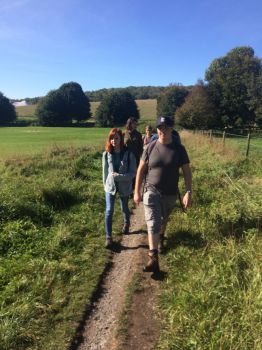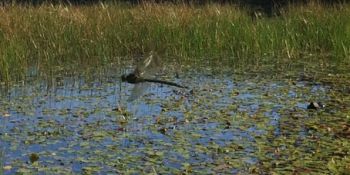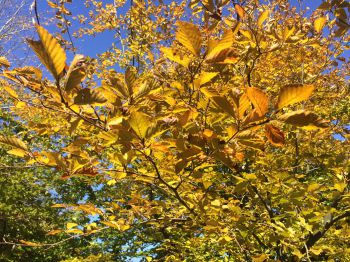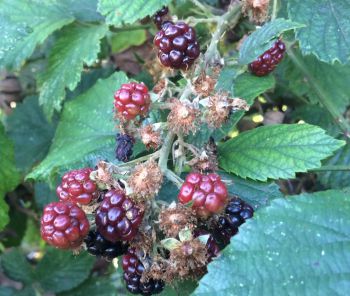Going wild off campus
By: Jacqui Bealing
Last updated: Thursday, 4 October 2018

Rosie Murfitt and Will Glasson lead the way

Southern Hawker dragonfly over the dew pond behind the Attenborough Centre

Going for gold: autumn leaves

The last of the blackberries
The University of Sussex Wildlife and Conservation Society are stepping out. JACQUI BEALING pulled on her boots and joined them.
It is a gloriously sunny autumn morning for the first Wildlife and Conservation Society (WildSoc) walk of the term. A dozen or so new students have turned up, including two ecologists, a biomedic, a postgraduate in physics and astronomy, and a visiting biology student from North Carolina.
They are greeted by Will Glasson and Rosie Murfitt, second-year zoology undergrads who help to run WildSoc. After an initial shyness, the walkers share information about what they’re studying and where they’re living, and set off from Northfield reception westwards towards Stanmer Park.
The American biologist is reflecting on why she wanted to come to Sussex – and to the UK. “My own government is destroying the environment,” she says. “Location was really important in my choice of university. At the Welcome Weekend I was asking ‘where is the nature? I know it’s here somewhere.’ People helpfully pointed up the campus.”
As we skirt a large patch of chalky rubble that’s being turned into calcareous grassland, the ecology students light up. They’ve heard their tutor Dr Alan Stewart talking about it, and have been wondering how to spell ‘calcareous’.
Next, we’re all clambering over a wooden fence into Stanmer Park. A butterfly flits past. Will thinks it might be a skipper, but the physicist suggests it’s a meadow brown. Will shields his eyes against the sun. “Yes, yes you’re right,” he says. “It’s orange and brown.”
The regular walk in the environs of campus is one of many activities the society will be running for its existing and new members; 162 signed up at Freshers’ Fair.
“We’re planning some trips, probably go to a nature reserve, perhaps again to the Booth Museum in Brighton,” says Will, as we enter the dappled light of Stanmer woods.
Rosie mentions the opportunities for surveys – a hedge sparrow survey on campus, an evening bat survey at a dew pond we have just passed, a reptile survey.
Reptile survey?
“Looking for slow worms, adders, grass snakes,” explains Will. “We might get a common lizard around here, but not a sand lizard.”
We have emerged from the woods and are now descending a path into the north end of Stanmer village. Swallows are swooping and darting over fields either side of us in the valley.
“It’s odd that they are still here,” says Will of the migratory birds that will be returning to Africa for winter. “It’s obviously still warm enough for them and the insect season seems to have been extended.”
The hot summer has affected other flora and fauna, he says. “The strawberries in the garden have tried to flower twice. Plants that like a cold summer, like snowdrops, probably aren’t enjoying it that much.
“There are a lot of wild damsons around, but not many sloes for this time of year. Damsons are juicy. Bite into a sloe and it’ll take all the moisture out of your mouth. They can both be used for gin, so it’s all good.”
One of the ecologists has misheard the conversation. “Bite into a slow worm? Why would you want to do that?”
Laughing, Will clarifies and adds: “I had a slow worm drop its tail on me over the summer.”
We head into Stanmer village, past a local resident off to post a letter, and a Shetland pony wandering around a small yard. Three walkers peel off – they have a talk back on campus to attend. The rest push on into a band of trees on the western side of the park.
“Speckled wood,” say Rosie and Will in unison as a butterfly passes us. No dispute this time.
We’re now among birdsong. Rustling dead leaves are underfoot. Will and Rosie think they see a goldcrest in the undergrowth. Rosie, who has brought along binoculars, is the bird expert, picked up from her dad’s interest in birdwatching.
But the conversation among the walkers as we take a wide loop back towards Northfield is now about other things; their interests, their families, why they chose their courses.
The society, like most of the Students’ Union societies, is ostensibly about socialising with like-minded people. As one of the new recruits says: “I’ve always liked nature and wildlife. When I was growing up, as a family we would go on country walks. I thought this would be a way of meeting people.”
Everyone makes it to the end. “That’s a good result,” says Will.
